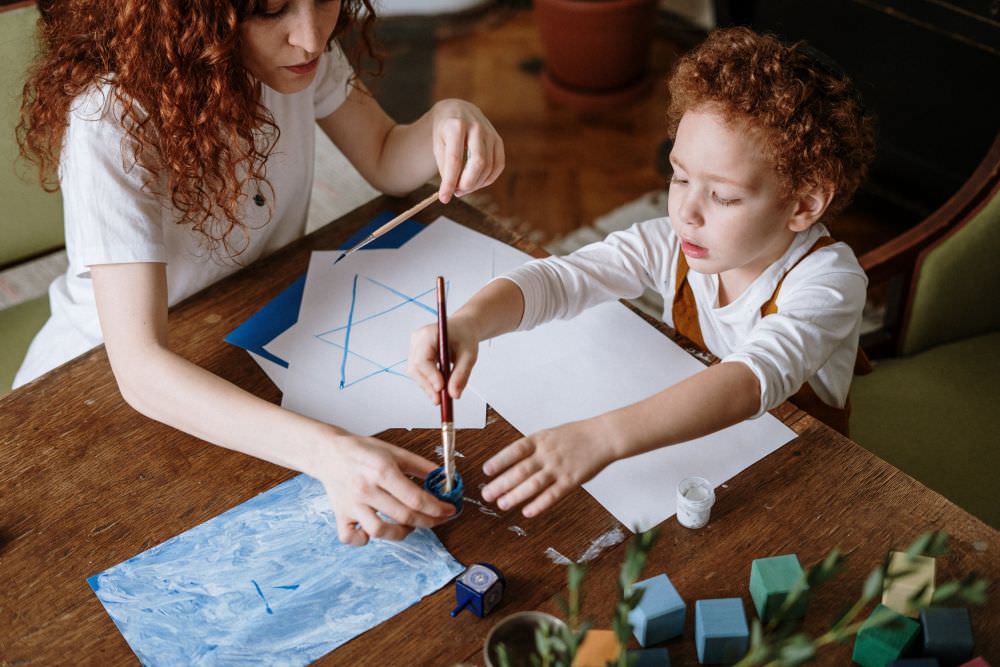Millions of people around the world are staring at an uncertain future in the midst of the ongoing pandemic. The lockdown, business closures, and economic slowdown have left millions of people jobless across the globe. Jobless claims continue to increase (in millions per week) at the time of writing this article.
As adults wade through fear and anxiety, what they may not realize is that children, too, are having a stressful time. If you do not pay attention, the stressful environment and lack of positive interactions and experiences for an extended duration of time can take a toll on your kids’ social and emotional well-being.
Therefore, understanding how you can support the social and mental well-being of kids during COVID-19 is important for all parents and caregivers. Let’s dig deeper into the matter and find out how to support the social and emotional well-being of kids during COVID-19.
In this article
What is social and emotional well-being?
‘Social and emotional well-being’ and ‘mental health’ are often used interchangeably. It refers to a person’s capacity to realize their abilities, cope with everyday stress, work/study productively, and contribute to the community.
Being emotionally well is to have the ability to identify one’s strengths and build-up and operate from them. It gives you the ability to respond to any situation in a manner that resonates with your body, mind, senses, and intuition.
Social well-being is about the ability to develop meaningful and positive relationships by using communication skills. It’s a function of how interconnected you are with others and whether you understand your ‘self’ – your actions, in particular – affect those around you.
The foundation of social and emotional well-being is laid during the formative years of a child.
| Also Read: Relationship between food and stress
Social and emotional well-being of children
In the case of children, social and emotional well-being refers to their developing capacity to explore the environment and acquire new knowledge and skills, form meaningful, close, and safe relationships, and experience, regulate, and express emotions.
In other words, ‘social and emotional well-being’ affects how young children relate to or interact with others in their environment, how they traverse learning curves in different areas, and how prepared they are to handle different emotions.
In order to develop advanced cognitive and social-emotional skills in the future, children need the right set of environments, relationships, and experiences today – according to a research paper published by the National Institute of Health Care Management Research and Educational Foundation (NIHCM).
Given the crisis situation we are in today due to the ongoing COVID-19 pandemic, child-care agencies as well as parents need to understand how to support the social and emotional well-being of kids during the unprecedented times of coronavirus COVID-19.
Children of today are the future of tomorrow.
The future growth and prosperity of the United States, or any community, country, or civilization depends on caregivers’ ability to nurture the health and well-being of children.
Researchers have established the fact that well-thought-out investments in children and families today can lead to significant health gains, increased productivity, and better savings in the future.
After several working papers and public presentations, it was in 2006 when members of the National Scientific Council on the Developing Child (NSCDC) actively began propagating the idea that children’s development was a wise area for public investment with a scientific report.
Since then, many administrators, politicians, governments, activists, and child-care experts have paid heed to the recommendations of the NSCDC.
Research shows that children with good health overall (starting with a would-be mother’s pre-conception health) and a powerful sense of well-being grow into adaptable, functioning adults who make positive contributions to their communities.
How is social-emotional well-being related to your kids’ health?
New scientific evidence from various fields including biology, genetics, neuroscience, and behavioral science has proved that social and emotional well-being is linked to a child’s health.
Developmental disruptions during the formative years can make a child more vulnerable to health problems as s/he grows up and even alter her/his brain’s actual structure.
Research shows that emotional distress can make kids (or adults) vulnerable to physical illnesses. For instance, kids under stress during annual school examinations are at a greater risk of catching an infection such as the common cold.
Many studies in the past have indicated that emotional distress can affect the immune response, thereby leading to physical illness.
Numerous epidemiological studies have demonstrated that individuals with greater social and emotional support are better protected against illnesses and can recover faster.
Further, many researchers have shown that stress and trauma during childhood is a major cause of a similar condition in adulthood.
How are COVID-19 and lockdown affecting the social and emotional well-being of kids?
Regardless of how old children are, they may be picking up on what their parents, family members, friends, teachers, and neighbors are going through. Simply put, children in your family may be absorbing a lot more stress and trauma than they normally do on a daily basis.
Your kids may be more stressed out than you are because they do not have the outlet, space, or even advanced communication skills to have conversations about what is going on in the world right now or what might happen next.
So, parents must educate their kids about the pandemic and lockdown.
During the COVID-19 lockdown, it’s likely that the social and emotional needs of kids have been neglected completely. Chances are your kids have not met or spoken to (virtually) their friends for several weeks now.
In the United States, approximately 12% of adolescents get mental healthcare at schools. In fact, for approximately 35% of vulnerable kids who are being treated for mental health issues, school is the only source of support. Since schools have been closed for many weeks now, parents need to make a serious effort to support the social and emotional well-being of kids during the COVID-19 pandemic.
The broader consequences of the coronavirus COVID-19 outbreak on children in the country or elsewhere in the world remain to be seen.
We will know in the future how the anxiety of growing up during a pandemic and lockdown, not going to school or practicing physical and social distancing, and the fear for loved ones has affected children and their social-emotional well-being.
How to educate your kids about the current situation (lockdown and pandemic)?
UNICEF recommends that parents and other family members must be willing to talk to children about the current situation.
Do not try to keep it a secret. It’s highly likely that they have already heard a few things about COVID-19 and lockdown. Chances are that they have started believing in some rumors concerning COVID-19. There are numerous fake and twisted stories going around.
Many stories or narratives can make young children imagine a ‘doomsday scenario’ or be excessively worried about the health and well-being of their family members and friends.
Therefore, you need to patiently listen to what they have to say and provide them with answers (as per their age) to questions such as:
- What is a virus? How does it look like? How does it attack people?
- Why are my schools closed? Why can’t I play with my friends?
- Why can’t I go out to the park?
- What does it mean to be dead?
- Why are you wearing a mask?
- Why should I wash my hands?
As parents, you know best how much information they can digest.
While answering kids’ questions, make it a point to provide them with necessary information on how everyone can stay safe from getting infected in a calm and supportive way.
Show them how to wash their hands with soap and water, how to use hand-sanitizer or how to cough and sneeze into their elbow.
If you do not know the answer to a question (kids can come up with strange yet important questions), tell a child you are working on it.
Use this opportunity to gather more information on COVID-19.
Keep children away from disturbing updates on social media, news channels, etc., as much as possible. If they are exposed to something distressing on the TV, have a conversation with them immediately, without infantilizing them.
Tips for parents to support emotional well-being of children during COVID-19
Social distancing does not require social isolation
Children need quality time with their near and dear ones. When a child is socially interconnected, she is more likely to build upon her strength to face difficult times or extraordinary situations.
So let your children get in touch with friends, cousins, and other important people in their lives through online video calls.
Be a source of age-appropriate information
There’s no one-size-fits-all template that you can follow to sensitize children to a global pandemic.
It’s an unprecedented situation and the best you can do is to provide age-appropriate information to kids. But if you intentionally withhold information, kids will just use their imagination.
Think of child-friendly ways to allay their doubts and worries while educating them about COVID-19 and lockdown.
Keep them occupied

Children tend to be more worried when they are bored. From music, art, and reading to indoor games, there are plenty of activities that can help keep kids busy at home.
Yes, you will need to be more creative as children will most likely get bored with one activity after a few days. So, you will need to keep coming up with new ideas.
Maybe you can teach your kids a new skill such as dancing, painting, writing, etc. or introduce them to new activities such as yoga, clay modeling, gardening, cooking, etc. during the COVID-19 lockdown.
Choose activities that reduce stress and bring joy.
Help kids increase their self-efficacy
Self-efficacy refers to a person’s belief in their capability to act in a certain manner in order to achieve something or deal with a situation. During the present crisis, when fear and uncertainty loom large, self-efficacy can help children feel more in control.
Make children feel they are playing an active role for themselves, their families, and their community. For instance, you can ask kids to follow hand and respiratory hygiene or practice social distancing to stop the spread of COVID-19. Some children may even help counter fake news concerning the COVID-19 pandemic among their friends. Others may enjoy cooking with family members or helping with daily chores.
When children have a greater sense of control, they tend to feel emotionally stable.
Create a safe environment
You can practice the three R’s namely reassurance, routine, and regulation to create a safe physical and emotional environment for kids while schools and daycare centers remain shut due to the pandemic.
First, reassure your kids about the fact that you will look after their safety. Reassurance from parents and other adults in the family can go a long way in alleviating stress about the virus.
Second, stick to routines on a daily basis. Routines help create a sense of safety and predictability. So, even when kids aren’t going to schools or playing in the street, make sure they wake up, sleep, eat, read books, watch TV, etc., as per a fixed schedule.
Third, help kids support their development of regulation. When you notice that your child is stressed, encourage her to participate in activities that can help her self-regulate. For instance, she can avoid social media platforms, do breathing exercises, or follow a daily routine in order to tame the stress.
Seek professional help if necessary
If you notice that emotional or behavioral changes are severe, seek professional help immediately. Excessive focus on anxieties, self-harm, nightmares, etc. are some indicators for professional intervention.
Final words
Remember that kids learn from those around them. They will observe whether adults in the family are observing preventive measures, eating right, remaining calm, being happy, and trying to be productive during the lockdown. Be sure to set the right role model.






